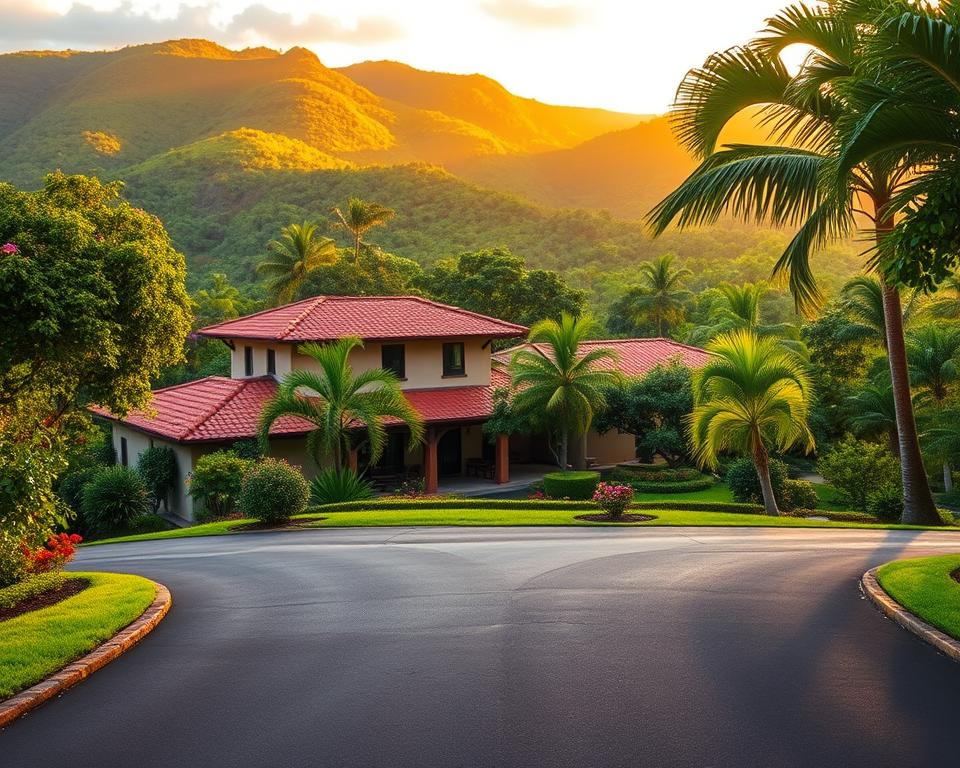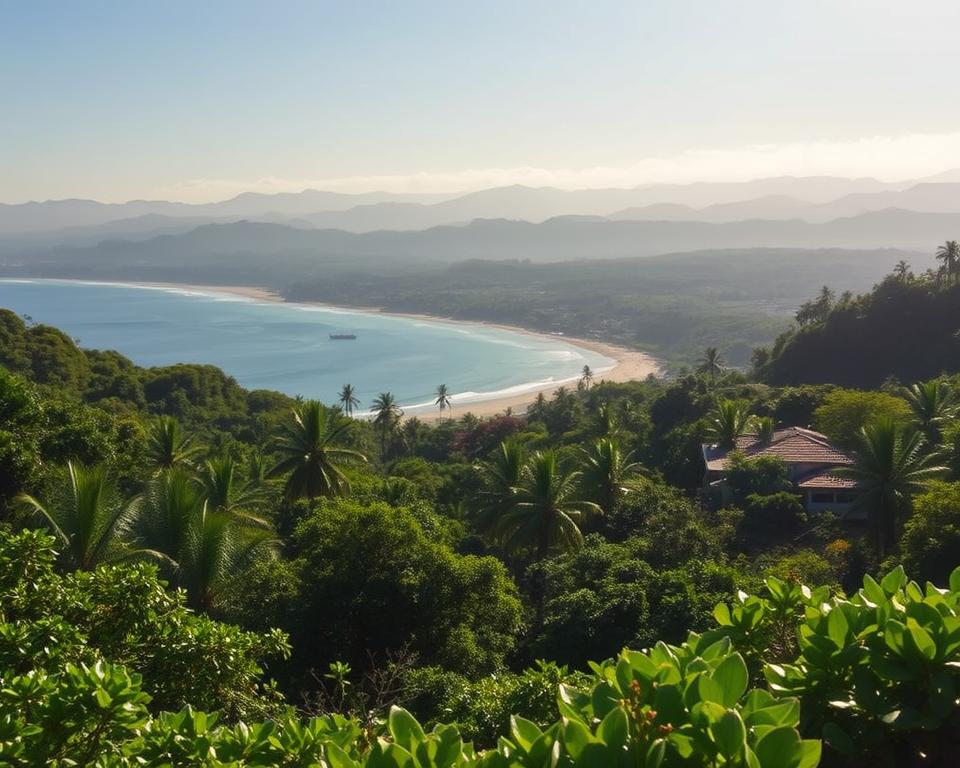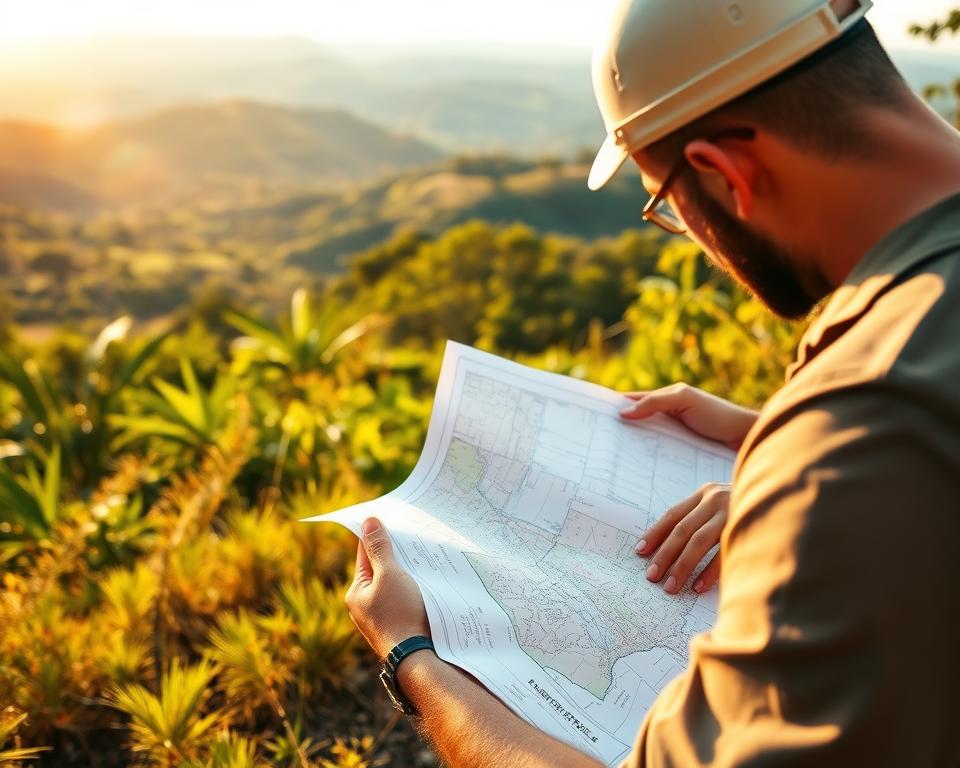Real Estate Selling Options in Costa Rica – Trusted Experts
At Gap Real Estate, we simplify the process of buying, selling, or investing in Costa Rica with our coast-to-coast expertise. With over two decades of experience, we deliver seamless transactions through expert guidance and clear communication.
Selling property in Costa Rica can be complex due to regional variations and specific legal considerations. Our comprehensive guide will walk you through the entire real estate selling process, from preparing your home to closing the deal successfully.
Whether you’re selling a beachfront property, a mountain retreat, or a home in the Central Valley, understanding your real estate options is crucial. Our team provides expert guidance to navigate the complexities of Costa Rica’s unique estate market.
Understanding the Costa Rica Real Estate Market
Understanding the intricacies of Costa Rica’s real estate market is crucial for successful property transactions. The country’s property market is influenced by its unique legal framework, geographical diversity, and the significant impact of foreign investment.

The Unique Characteristics of Costa Rica’s Property Market
Costa Rica’s real estate market operates differently from many North American and European markets. One of the key differences is the absence of a centralized Multiple Listing Service (MLS) system, which means sellers must list their properties with individual agents or agencies. This can complicate the process for both sellers and buyers.
Property ownership information is maintained in the National Register, but accessing complete historical data can be challenging without knowing the owner’s name. This lack of transparency can affect how properties are marketed and sold.
The legal framework for property ownership in Costa Rica also differs from many other countries, impacting the selling process. Recent regulatory changes, including stricter money laundering laws and the implementation of capital gains tax, have further complicated property transactions.
Regional Differences: From Beach Properties to Central Valley Homes
The Costa Rican real estate market is segmented by regions, with distinct pricing trends and buyer preferences in coastal areas versus the Central Valley. Foreign investment has significantly shaped the market, creating unique opportunities and challenges for sellers.
Each region has its own micromarket with different property types, price points, and buyer demographics. Understanding these regional differences is crucial for sellers to maximize their property’s exposure to the right buyer pool. For instance, beach properties may appeal to tourists and foreign investors, while Central Valley homes might attract local buyers and those looking for a more urban lifestyle.
Seasonal demand fluctuations also play a significant role, with the high tourist season (December-April) typically bringing more potential buyers. Sellers must tailor their strategies to the specific region and property type to succeed in Costa Rica’s diverse real estate market.
Real Estate Selling Options in Costa Rica
When it comes to selling your property in Costa Rica, you have several options to consider, each with its pros and cons. Understanding these options is crucial to making an informed decision that aligns with your financial goals and timeline.
Working with a Professional Real Estate Agency
Working with a professional real estate agency can significantly simplify the selling process. These agencies provide access to established networks, marketing resources, and negotiation expertise that individual sellers typically lack. Professional agents understand the nuances of the Costa Rican market and can help navigate cultural and language barriers that often complicate transactions.
For Sale By Owner (FSBO) Approach
The For Sale By Owner (FSBO) approach may seem cost-effective but often results in longer selling times and lower final sale prices due to limited exposure and negotiation challenges. FSBO sellers face significant hurdles in Costa Rica, including limited access to qualified buyers, difficulty navigating legal requirements, and challenges with property valuation.
Lease-Option Arrangements
Lease-option arrangements offer an alternative selling strategy where buyers lease the property with an option to purchase. This approach provides a solution for sellers who need to relocate quickly. Although not very customary in Costa Rica, lease-option arrangements can be a viable option for those looking for a faster sale.
Understanding the pros and cons of each selling option allows you to make an informed decision based on your timeline, financial needs, and comfort with the selling process. Whether you choose to work with a professional agency, go FSBO, or explore lease-option arrangements, it’s essential to consider the unique characteristics of the Costa Rican real estate market.
The Challenges of Selling Property in Costa Rica
Costa Rica’s real estate market presents unique obstacles for sellers to navigate. When selling a property in this beautiful country, one must be aware of the potential issues that can arise during the process.
Lack of Centralized MLS System
The absence of a centralized Multiple Listing Service (MLS) in Costa Rica creates significant marketing challenges. Sellers must list their property with multiple agents or agencies to achieve adequate exposure. This fragmented approach can lead to confusion among potential buyers, making it difficult for them to discover available properties.

Without a unified system, property information is scattered across various platforms, complicating the search process for buyers. This limitation underscores the importance of working with a knowledgeable real estate agency that can effectively market a property to potential buyers.
Cultural and Language Barriers
Cultural differences in negotiation styles and expectations can lead to misunderstandings between foreign sellers and local buyers. Language barriers often complicate transactions, with nuances lost in translation that can affect contract terms and conditions. These challenges highlight the need for clear communication and cultural understanding in the selling process.
Legal Complexities for Foreign Sellers
Foreign sellers face additional legal complexities, including tax implications in both Costa Rica and their home country. The legal framework for property ownership and transfer differs significantly from North American and European systems, requiring specialized knowledge. Documentation requirements can be extensive and unfamiliar to foreign sellers, necessitating professional guidance to navigate these complexities.
Understanding these challenges in advance allows sellers to develop strategies to address them proactively, ensuring a smoother transaction process.
Setting the Right Price for Your Costa Rican Property
Pricing your Costa Rican property correctly is crucial for a successful sale. Sellers often face challenges in determining the optimal price due to various factors, including emotional attachment, financial needs, and lack of market data.
Common Pricing Mistakes Sellers Make
Many sellers in Costa Rica make critical pricing mistakes that can delay or jeopardize the sale of their property. Some common errors include overpricing based on personal financial goals rather than market realities.
- Overpricing is often driven by emotional or financial needs rather than the property’s actual market value.
- Personal financial goals, such as retirement funds or purchasing another property, should not dictate the asking price.
- The discrepancy between property tax values (0.25% of registered value) and market values can confuse sellers.
How to Determine Market Value in Costa Rica
To accurately determine the market value of your property in Costa Rica, it’s essential to analyze comparable sales. However, the limited availability of public data makes it necessary to work with experienced real estate professionals.
- Regional price variations are significant, with properties in tourist destinations commanding different prices than those in less developed areas.
- The condition of infrastructure, such as roads and utilities, impacts property values differently than in North American markets.
- Currency fluctuations between the US dollar and Costa Rican colón can affect pricing strategies.

Understanding the target buyer demographic and seasonal market fluctuations is also crucial for effective pricing. Realistic pricing based on current market conditions typically results in faster sales and better final terms.
Preparing Your Property for a Successful Sale
To stand out in Costa Rica’s competitive real estate market, sellers must prepare their properties carefully. A well-presented property not only attracts more potential buyers but also can significantly impact the sale price.
Improving Curb Appeal for Costa Rican Buyers
Curb appeal is particularly important in Costa Rica’s competitive market, where lush landscaping and well-maintained exteriors create strong first impressions. Property presentation standards in Costa Rica differ from North American expectations, with a greater emphasis on outdoor living spaces and natural integration. To enhance curb appeal, we recommend maintaining a well-manicured lawn, adding tropical plants, and ensuring that the exterior of the property is in good condition.
Professional Photography and Presentation
Professional photography is essential in a market where many buyers begin their search online from other countries before visiting in person. High-quality images that showcase property features, views, and outdoor spaces are crucial for attracting international buyers. We suggest working with a photographer who understands the Costa Rican market and can capture the unique aspects of your property.
Addressing Maintenance Issues Before Listing
Addressing maintenance issues before listing is critical in Costa Rica, where the tropical climate can accelerate deterioration of buildings and grounds. Common maintenance concerns include moisture issues, roof integrity, drainage systems, and pest control – all of which should be addressed pre-listing. By doing so, we can ensure that the property is presented in its best condition, reducing the likelihood of last-minute negotiations or sale delays.
Preparing a property for sale in Costa Rica involves a combination of enhancing its appeal, maintaining its condition, and presenting it effectively to potential buyers. By focusing on these key areas, we can increase the chances of a successful sale.
The Property Selling Process in Costa Rica
To navigate the Costa Rican real estate market effectively, it’s crucial to understand the selling process. The process involves several key steps, from initial negotiations to the final closing.
Making and Receiving Offers
The selling process in Costa Rica typically begins with verbal negotiations, but it’s essential to formalize all offers in writing to avoid misunderstandings. Unlike in North America, verbal offers in Costa Rica do not create legal obligations, making written documentation crucial throughout the process.
When making an offer, the buyer can either sign a purchase option and pay a non-refundable fee or sign a sales agreement with a deposit.
Purchase Options and Sales Agreements
Purchase options involve a non-refundable fee that gives buyers exclusive rights to purchase within a specified timeframe. This is commonly used for development properties or when significant financing is needed.
Sales agreements are more common for residential transactions, typically requiring a deposit (usually 10% but negotiable) and outlining all terms of the sale, including contingencies for due diligence findings and financing requirements.
The Closing Process
The closing process in Costa Rica typically involves a notary public (who must be a lawyer) who prepares the final deed transfer. Transfer taxes and fees amount to approximately 3-4% of the registered sale price and are customarily split between buyer and seller.
The timeframe from accepted offer to closing varies significantly based on property complexity, typically ranging from 30-90 days. Understanding the legal requirements for property transfers is essential to avoid delays or transaction failure.
By understanding these steps and working with a professional real estate agency, sellers can navigate the Costa Rican property selling process with confidence.
Due Diligence: Essential Steps for a Clean Transaction
In Costa Rica’s unique real estate landscape, due diligence is more than just a formality; it’s a necessity. When buying or selling a property, thorough investigation is crucial to avoid potential pitfalls and ensure a smooth transaction.
Title: Research and Property Surveys
Title research is a critical step in due diligence, verifying not only the current ownership but also historical transfers to identify any potential claims or irregularities. Property surveys (“planos catastrados”) should be verified against the physical boundaries and the information registered in the National Registry. Discrepancies between survey measurements and title documentation are common in older properties and must be resolved before proceeding with a sale.

Handling Home Inspections in Costa Rica
Home inspections in Costa Rica are not regulated, making the selection of qualified inspectors crucial for an accurate assessment. Since properties are sold “as is” without standard seller disclosures, buyers must take extra care to identify potential issues. We recommend conducting the home inspection before signing the option to purchase-sale agreement and depositing earnest money into escrow.
Legal Verification of Ownership and Liens
Legal verification should include checking for liens, encumbrances, easements, and rights of way that may not be immediately apparent. It’s also essential to verify water rights and access, particularly in certain regions, and to investigate any environmental regulations that may impact property use and development potential. Due diligence findings should be documented and addressed in the sales agreement to protect both parties and establish clear expectations.
Timeframes: How Long Does It Take to Sell in Costa Rica?
Sellers in Costa Rica often wonder how long it will take to sell their property, and the answer depends on several key factors. The timeframe for selling a property in Costa Rica can vary significantly based on market conditions, the type of property, and the seller’s approach.
Factors Affecting Selling Time
Several factors influence the time it takes to sell a property in Costa Rica. These include the property’s location, type, and price point, as well as the seller’s motivation and pricing strategy.
- Location plays a crucial role, with properties in established tourist destinations and the Central Valley typically selling faster than those in remote areas.
- The condition and presentation of the property directly impact selling time, with well-maintained properties attracting more interest.
- Pricing strategy is also critical, with properties priced within 5-10% of market value selling significantly faster than those priced 15% or more above market value.
Strategies to Accelerate Your Sale
To accelerate the sale of your property in Costa Rica, consider implementing comprehensive marketing strategies, including international exposure and professional photography. Working with experienced real estate professionals who understand the local market dynamics can also result in faster sales.
- Flexibility in negotiation and willingness to consider creative financing options can expand the buyer pool.
- Motivated sellers who price their properties competitively typically sell within 3-6 months.
By understanding the factors that affect selling time and implementing effective strategies, sellers in Costa Rica can optimize their chances of a successful and timely sale.
Why Gap Real Estate: Your Trusted Partner for 20+ Years

At Gap Real Estate, we’ve spent over two decades perfecting our craft in Costa Rica’s dynamic real estate market. With a deep understanding of the local landscape and a coast-to-coast presence, we’re uniquely positioned to guide you through the process of selling your property.
Coast-to-Coast Expertise Across Costa Rica
Our extensive experience spans from the beaches of Guanacaste to the residential communities of the Central Valley. This comprehensive knowledge allows us to develop targeted selling strategies that cater to the unique characteristics of each property and region.
End-to-End Support Throughout the Selling Process
We provide comprehensive support from initial property valuation to final closing procedures. Our multilingual team navigates cultural and language barriers to ensure a seamless transaction experience.
Results-Driven Approach to Property Sales
Our approach focuses on realistic market valuations and effective marketing strategies that attract qualified buyers. With a proven track record of successful property sales, we achieve optimal results for sellers across all property types and price points.
By choosing Gap Real Estate, you’re partnering with a trusted expert that simplifies the selling process, ensuring clarity, confidence, and a stress-free experience.
Conclusion: Navigating Your Costa Rica Real Estate Sale with Confidence
To ensure a smooth and profitable sale of your Costa Rican property, it’s essential to work with experienced professionals. Selling property in Costa Rica presents unique challenges and opportunities that require specialized knowledge and strategic planning. At Gap Real Estate, our 20+ years of experience across Costa Rica positions us uniquely to guide you through every aspect of your property sale.
Contact us today at www.gaprealestate.com, call/WhatsApp +(506)-4001-6413, or email [email protected] to discuss your Costa Rica property selling needs.




